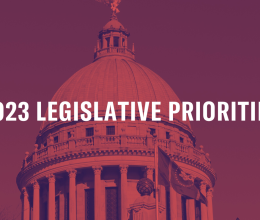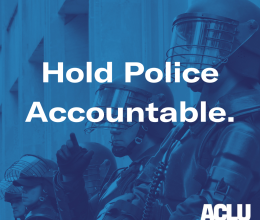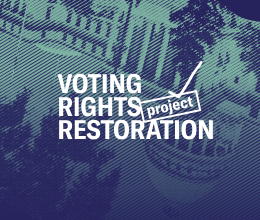The ACLU of Mississippi's work strives for an America free of discrimination against people with disabilities, where people with disabilities are valued, integrated members of society who have full access to education, homes, healthcare, jobs, and families.
Accessibility Rights
All persons with disabilities shall have the right to:
- Use public places
- Full and equal access to public places which the general public is invited
- Be accompanied by a guide dog or hearing ear dog
- on a blaze orange leash
- especially trained for the purpose
- without being required to pay an extra charge
- liable for any damage done to the premises or facilities by such dog
- Take dog or other animal into conveyances and places
- the dog or other animal shall not occupy a seat in any public conveyance
- must be leashed or otherwise sufficiently restrained
White Canes & Guide Dog
- Whenever a pedestrian is crossing or attempting to cross a public street or highway, at or near an intersection or crosswalk, guided by a guide dog or carrying in a raised or extended position a cane or walking stick:
- the driver of every vehicle approaching shall take such precautions as may be necessary to avoid injuring or endangering such pedestrian, and if injury or danger to such pedestrian can be avoided only by bringing his vehicle to a full stop, he shall bring his said vehicle to a full stop. The word “vehicle,” when used in this section, does not include a train operated on railroad tracks.
- Nothing contained in this section shall be construed to deprive any totally or partially blind or otherwise incapacitated person, not carrying such a cane or walking stick or not being guided by a dog, of the rights and privileges conferred by law upon pedestrians crossing streets or highways. The failure of such totally or partially blind or otherwise incapacitated person to carry a cane or walking stick or to be guided by a guide dog upon the streets, highways or sidewalks of this state, shall not be held to constitute or be evidence of contributory negligence.
- It shall be unlawful for any person, unless they are DISABLED, while on any public street or highway, to carry in a raised or extended position a cane or walking stick which is metallic or white in color, or white tipped with red.
- Violation of this section shall be punishable by a fine of not more than twenty-five dollars ($25.00) or by imprisonment in the county jail for not more than ten (10) days.
- Each year the governor shall publicly proclaim October 15 as White Cane Safety Day.
Employment Rights
No person shall be refused employment in state service, the service of political subdivisions of the state, in public schools, or any other employment supported in whole or in part by public funds, by reason of his being blind, visually handicapped, deaf, or otherwise physically handicapped, unless such disability shall materially affect the performance of the work required by the job for which such person applies.
The Americans with Disabilities Act gives you the right to be free from discrimination in the workplace. That means that your employer cannot discriminate against you for being a person with a disability when making employment-related decisions, including hiring, firing, promotions, training, leave, and benefits.
An obligation to inform employers regarding disability depends on when:
- Application State - Not required unless accommodation needed for application process.
- Post Offer - Must tell as long as all new hires in same job category are asked to do the same.
- Employment State - Inquiry and examination must be "job related and consistent with business necessity."
Advancement or termination:
- Employers are not permitted to consider your diagnosis when making decisions regarding your advancement or termination.
Employers are not liable for employment discrimination when:
- Denial of a job to an individual with a disability is consistent with business necessity; and
- The job in question cannot be accomplished with reasonable accommodations.
- Employer is not required to make accommodations for you that would pose an undue hardship for the employer.
- restructuring of the job,
- modification of work schedules,
- modification of location,
- installation of equipment or
- reassignment to another position.
Researching reasonable accommodations:
- The ADA: www.ada.gov, or 1-800-514-0301, or TTY 1-800-514-0383.
- The Equal Employment Opportunity Commission: www.eeoc.gov,or 1 800 669- 4000, or TTY 1-800-669-6820.
- The Job Accommodation Network: www.jan.wvu.edu, or 1-800-526-7234, or TTY 1-877-781-9403.








